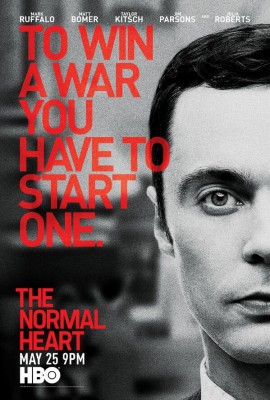Film Reviews

The Normal Heart
Genre: Drama
Director: Ryan Murphy
Cast: Mark Ruffalo, Jim Parsons, Taylor Kitsch, Julia Roberts, Matt Bomer,
MPAA-Rating:
Release Date: May 25th, 2014
In The Normal Heart, nurse gay activist Tommy Boatwright (Jim Parsons) has a particular way of remembering the incredible individuals he knows, see cares about and loves who ultimately die from the AIDS virus in the early 1980s. He saves all of their Rolodex cards in one of his desk drawers.
In the new HBO film, what is ed that drawer slowly but surely fills up with names, numbers and memories of those who are lost to what was then referred to as the “gay cancer.”
Mark Ruffalo stars in the film as Ned Weeks, an agitated and angry gay activist who watches his friends slowly succumb to the disease as it tears through the gay community. Ned isn’t a politician, nor does he care for them. He wants answers to why his friends are dying and is willing to denounce anyone who stands in the way of his search.
As Ned watches his circle of friends get decimated by the fast-moving disease, he allies himself with a group of gay men who have witnessed the same events (and watched, in similar fashion, as their own friends and lovers die mysteriously). Together, the group forms “The Gay Men’s Health Crisis”— a organization of men who can barely agree on anything but know something must be done. Outside of their organization, the group’s main ally is Dr. Emma Brookner (Julia Roberts), a wheelchair-bound woman who without hesitation treats these men with the respect they deserve.
Arguing that promiscuity is spreading the disease, she states that gay men should stop having sex until the crisis has been mitigated. Ned scoffs at the notion saying that she is talking about “millions of men who have singled out promoscuity as their principal political agenda.” Her ultimate goal, of course, is to save lives but many members of the gay community are underestimating how deadly this disease will eventually become.
With the assistance of director Ryan Murphy (Glee), writer Larry Kramer– who wrote the original play which this movie was adapted from– brings the story to vivid life onscreen, especially the character of Weeks himself. Much to its credit, the feature never makes Weeks into the story’s flawless hero and some will leave the picture supporting his methods while others (like some of the characters in the story) will deem him too aggressive to serve as an important leader in this cause. Kramer based the story on his own life so it’s hard not to be impressed by his ability to honestly survey the situation and present his opponents in the movement as noble-intentioned men who simply disagreed with his methods.
As the creator of Glee, Murphy has previously lost sight of characters and fallen into an unsophisticated sanctimonythat undermines his stories. For most of this picture, though, the preachiness is kept at bay, letting the characters simply experience the pains and sorrows of this situation. There are a few hits at both the Mayoral administration of Ed Koch in New York and at President Ronald Reagan( the criticisms of that president seem out of place though as the center of the story is told around New York and the Mayor’s denial of this major epidemic, not the national implications of the disease).
Beyond that, the number of deaths experienced in the film seems overwhelming (especially for a film that clocks in a few minutes beyond two hours). One can understand why Kramer includes so many characters who die from the disease but because of that, many of their deaths lack the emotional resonance that would otherwise exist. Regardless though, in this current age, it’s important to appreciate how alien and mysterious the AIDS epidemic once was. The strong cast here (including Roberts, Ruffalo, Parsons, Taylor Kitsch and Alfred Molina) bring a passionate resilience to their characters and ensure that The Normal Heart– a heart-wrenching and powerful drama– is not something that can be easily forgotten.
Review by: John Hanlon












